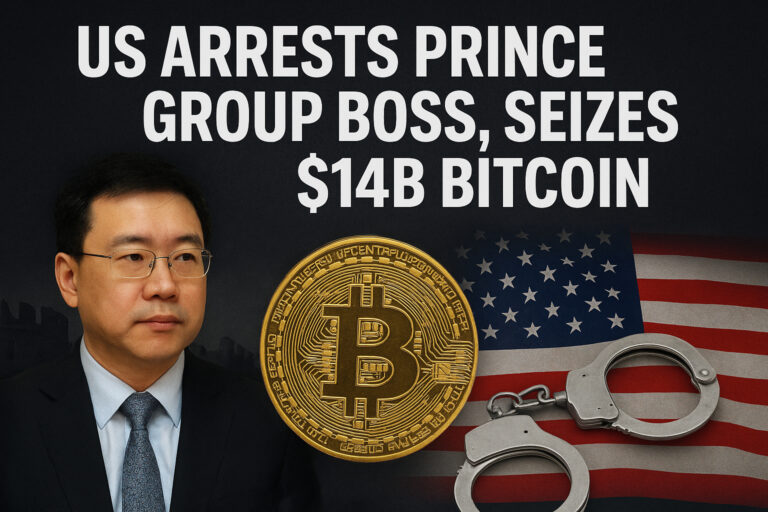Premium Biz Post – In a sweeping crackdown on global crypto crime, US arrests Prince Group boss, seizes $14B Bitcoin, revealing one of the largest cryptocurrency frauds ever uncovered. The case exposes a vast network that links cybercrime, forced labor, and money laundering in Southeast Asia.

A Record Seizure and Global Operation
The US Department of Justice (DOJ) and Treasury confirmed the seizure of $14 billion in Bitcoin tied to crimes led by Chen Zhi, the chairman of Prince Holding Group in Cambodia.
The joint task force, involving the US, UK, and Interpol, traced digital wallets and bank accounts across Asia and Europe. They uncovered a massive “pig butchering” network — a scam where fraudsters win trust before tricking people into fake crypto investments.
Officials called it a “global criminal enterprise.” They said Chen’s group laundered billions through crypto exchanges, shell companies, and offshore accounts.
Who Is Chen Zhi?
Chen Zhi, a Chinese-born businessman based in Cambodia, gained fame for leading Prince Holding Group. His company has major stakes in real estate, finance, and hospitality. For years, he appeared as a successful entrepreneur and philanthropist.
Now, he faces multiple US charges: wire fraud, money laundering, and running an unlicensed financial business. Prosecutors claim Chen used his companies to move and hide illegal profits from scams and forced labor operations.
If found guilty, Chen could face decades in prison and lose billions in assets.
Inside the “Pig Butchering” Scheme
The “pig butchering” scam—named after the method of fattening and killing a pig—uses emotional manipulation. Criminals contact victims through social media or dating apps, build trust, and push fake investment platforms that display fake profits.
Once victims invest more money, the websites vanish. According to US Homeland Security, this network made millions of dollars per day. The profits were funneled into crypto wallets, converted into Bitcoin, and then dispersed through exchanges to hide their origin.
The Hidden Human Toll
The investigation also revealed severe human rights abuses. Thousands of people were trafficked to scam compounds in Cambodia, Laos, and Myanmar. Many were promised legitimate jobs but were later forced to work under threat and violence.
Victims from Indonesia, Vietnam, and the Philippines reported being locked inside guarded facilities. They were beaten if they refused to scam others. Human rights groups called these places “modern slavery camps.”
International pressure forced Cambodian authorities to raid several compounds. However, many operations quickly reappeared under new names. Chen Zhi’s alleged link to these crimes has intensified global outrage.
Read More : ”Decorative and Accessory Crafts A Touch of Creativity to Beautify Spaces and Style”
Tracking the $14 Billion in Bitcoin
Investigators followed blockchain trails from thousands of transactions tied to Prince Group’s network. They froze wallets holding Bitcoin, Ethereum, and Tether.
The US Treasury’s Office of Foreign Assets Control (OFAC) confirmed that it used blockchain analytics firms to trace the flow of money.
Authorities transferred the seized assets into US-controlled wallets. Some funds have already been used to compensate victims. Officials called the case a breakthrough in digital forensics and cross-border cooperation.
Political and Global Reactions
The arrest has shaken Cambodia’s business and political landscape. Chen Zhi had strong ties with influential leaders, which now face renewed scrutiny.
The Cambodian government promised to “cooperate with international partners to fight cybercrime.” Opposition groups, however, demanded transparency and called for deeper investigations into corporate corruption.
Globally, regulators praised the move. The G20’s Financial Stability Board (FSB) highlighted the case as proof that stronger crypto regulations are urgently needed. Many nations still lack consistent laws for tracking digital assets across borders.
Crypto Industry Responds
Crypto companies reacted cautiously. Binance and Coinbase executives supported law enforcement, saying that rooting out criminal activity will strengthen public trust.
However, some traders worried that the case could bring tighter restrictions and limit innovation.
Bitcoin’s price briefly dipped after the news broke, as investors feared greater regulatory pressure. Analysts, though, believe enforcement will eventually make the crypto market more secure and transparent.
A Turning Point for Digital Regulation
Experts view this case as a turning point in crypto regulation. The European Union’s MiCA law will soon standardize digital asset rules, while the US debates comprehensive crypto legislation.
Southeast Asian countries, including Cambodia, Thailand, and Vietnam, are also reviewing their frameworks to prevent similar crimes.
The arrest of Chen Zhi and the $14 billion seizure show how financial crimes now span borders and technologies. They also prove that governments can adapt to track and prosecute digital criminals.
What’s Next
Chen Zhi remains in US custody as extradition and trial proceedings begin. Prince Holding Group is under investigation in multiple countries. The DOJ and Interpol are working with victims’ groups to identify and support people affected by the scams.
Authorities plan to use part of the recovered Bitcoin to repay losses. Legal experts predict the case could last years, but it already marks one of the largest crypto crackdowns ever.
The story of US arrests Prince Group boss, seizes $14B Bitcoin reveals the double-edged nature of digital finance. Crypto offers freedom and innovation, but it also enables global crime when unchecked.
This case sends a clear message: anonymity cannot protect criminals forever. With global cooperation, technology, and determination, justice can prevail — even in the complex world of cryptocurrency.



